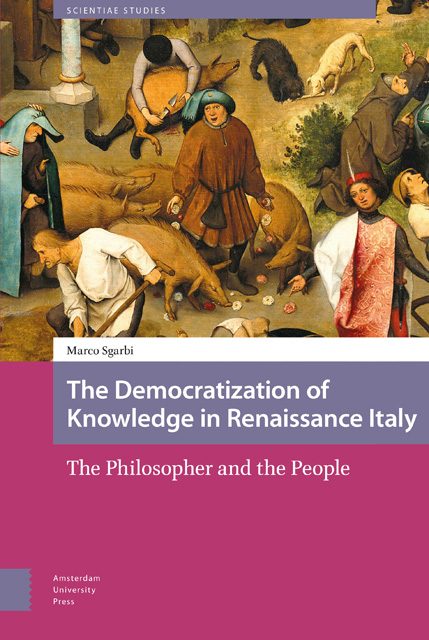4 - Intentions for Democratizing
Published online by Cambridge University Press: 15 June 2023
Summary
Abstract
Chapter 4 deals with the intentions behind the project for the democratization of knowledge. In the first part, the focus is on the Erasmian legacy in democratizers like Antonio Brucioli, Cornelio Musso and Bernardino Tomitano, who reflect on their goals of making knowledge accessible to ordinary people starting with religious texts as a means of acquiring ethical behaviour appropriate for a Christian. The second part shows how, with the same arguments, intellectuals like Alessandro Piccolomini, Benedetto Varchi, Sperone Speroni and Giovan Battista Gelli had similar intentions concerning the promotion of the process of democratization of lay knowledge. The main objective was to educate people for the realization of a human beings’s moral nature. The last section of the chapter explains the fundamental role that language played in the democratization of knowledge for these intellectuals.
Keywords: Democratization, Education, Ethics, Intentions
Erasmian Echoes
In sixteenth-century Italy, especially in the thirties and forties, many intellectuals were influenced by the Erasmian exhortation to vulgarize and popularize knowledge. Among these, a special place should be reserved for Antonio Brucioli, who in his vulgarization of the Bible and in his commentaries used and drew great inspiration from Erasmus’s writings and paraphrases.
In his vulgarizations, Brucioli’s intentions was to make the truth available to all people, echoing Erasmus’s work. His 1538 dedicatory letter to King Francis I of France in his translation of the New Testament is clear on this:
And to those who piously say that it is dangerous to put this light before common eyes because it contains difficult and dark things, which the simple people are not given to understand and therefore are put at risk of being led astray, I shall say first of all that they should take the matter up with the Holy Spirit, who wanted to reveal these high secrets to simple people and idiots, judging them to be more worthy because their heads were not cluttered with worldly wisdom.
Brucioli’s words are an indirect response to Alberto Pio: vulgarizations are not only important, but also a moral and religious duty, because otherwise there would be no way of explaining why Christ “sent the Holy Spirit to make illiterate men speak and be understood in all languages.”
- Type
- Chapter
- Information
- The Democratization of Knowledge in Renaissance ItalyThe Philosopher and the People, pp. 79 - 118Publisher: Amsterdam University PressPrint publication year: 2022



